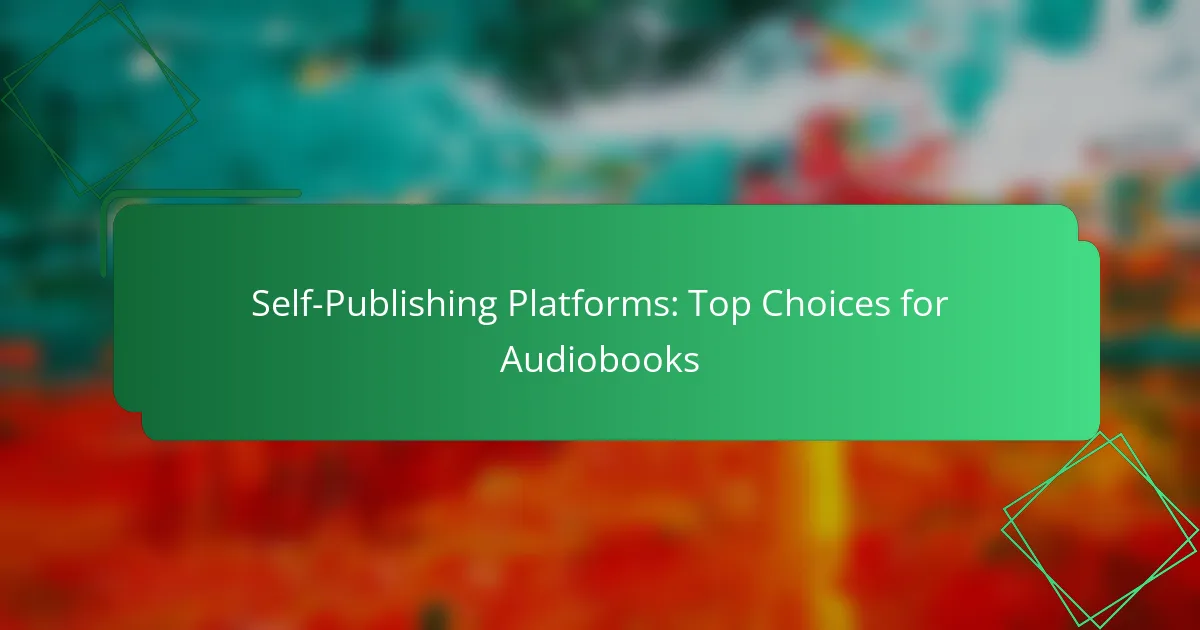Self-publishing audiobooks has become increasingly accessible, with various platforms offering distinct features and distribution options tailored to authors’ needs. Choosing the right platform is crucial, as it can affect your reach, control over rights, and potential earnings. Factors such as royalty rates, production tools, and marketing support should be carefully considered to ensure your audiobook’s success.
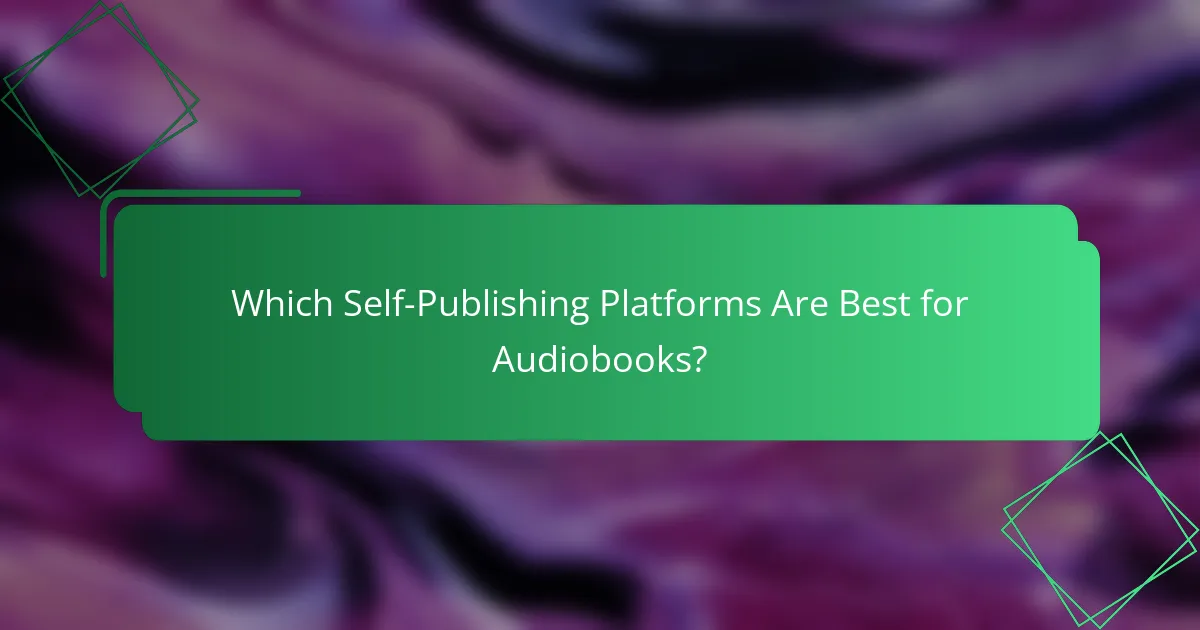
Which Self-Publishing Platforms Are Best for Audiobooks?
Several self-publishing platforms cater specifically to audiobooks, each offering unique features and distribution options. The best choice depends on your goals, whether it’s maximizing reach, retaining control over rights, or earning higher royalties.
Audible
Audible is one of the largest and most recognized platforms for audiobooks, providing access to millions of listeners. Authors can publish their audiobooks through Audible’s extensive distribution network, which includes Amazon and iTunes.
When using Audible, consider their royalty structure, which typically offers around 40% for exclusive titles and 25% for non-exclusive ones. This can significantly impact your earnings, so weigh the benefits of exclusivity against potential wider distribution.
Findaway Voices
Findaway Voices offers a flexible platform for authors looking to distribute their audiobooks across various retailers and libraries. This service allows you to maintain control over your rights while reaching a broad audience.
With Findaway, you can choose your distribution channels, including libraries and platforms like Google Play and Apple Books. Their royalty rates are competitive, often around 60% for direct sales, making it an attractive option for independent authors.
ACX
ACX, or Audiobook Creation Exchange, connects authors with narrators and producers to create audiobooks. It operates under the Audible umbrella, allowing authors to publish directly to Audible, Amazon, and iTunes.
Authors can choose between a royalty share model or a pay-upfront option for production costs. This flexibility can help you manage your budget while still producing a quality audiobook.
Kobo Writing Life
Kobo Writing Life is primarily known for eBooks but has expanded to include audiobooks. This platform allows authors to publish their audiobooks and distribute them through Kobo’s global network.
While Kobo may not have the same reach as Audible, it offers a straightforward publishing process and competitive royalty rates, typically around 70%. This can be a good option for authors looking to diversify their distribution channels.
Google Play Books
Google Play Books allows authors to publish audiobooks directly to the Google Play Store, reaching a vast audience of Android users. This platform is particularly beneficial for those who want to tap into the growing market of audiobook listeners on mobile devices.
Authors can set their own prices and earn around 70% royalties on sales. However, keep in mind that Google Play Books has specific formatting requirements, so ensure your audiobook meets their standards before publishing.
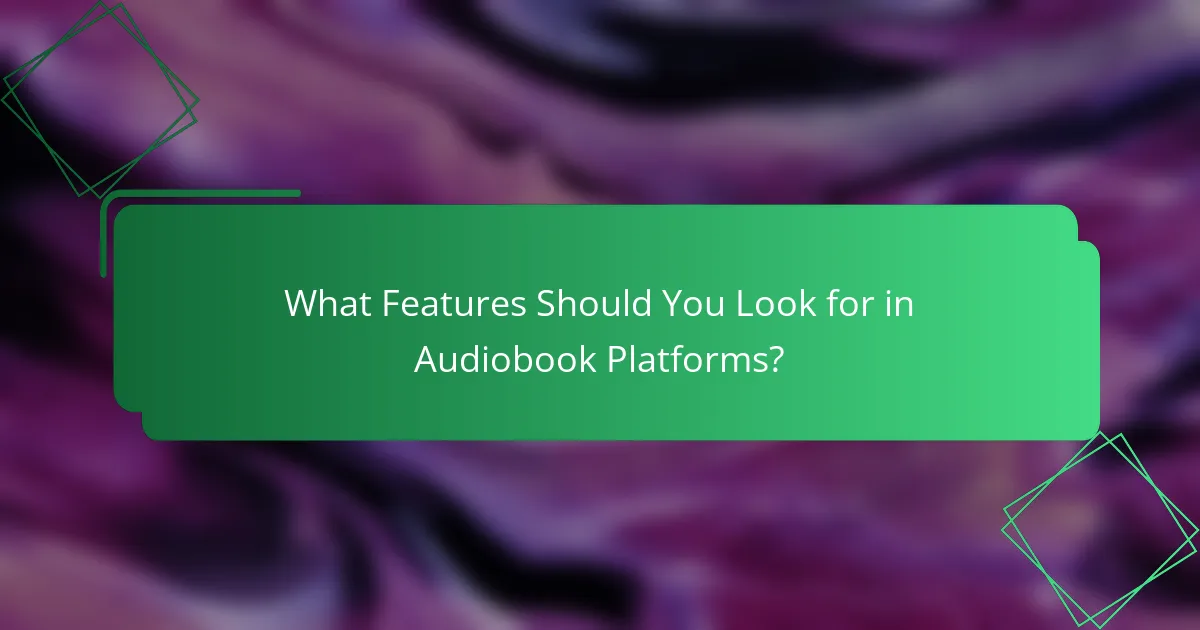
What Features Should You Look for in Audiobook Platforms?
When selecting an audiobook platform, consider features like distribution reach, royalty rates, production tools, and marketing support. These elements will significantly impact your audiobook’s success and profitability.
Distribution Reach
Distribution reach refers to how widely your audiobook can be made available across various platforms and retailers. Look for platforms that partner with major audiobook distributors like Audible, Google Play, and Apple Books to maximize your audience.
Some platforms offer exclusive distribution deals, which can limit your reach but may provide higher royalties. Weigh the benefits of exclusivity against broader distribution to find the right balance for your goals.
Royalty Rates
Royalty rates determine how much you earn from each sale of your audiobook. Most platforms offer rates ranging from 25% to 70%, depending on factors like exclusivity and distribution channels.
Be sure to read the fine print regarding payment structures, as some platforms may have additional fees or conditions that affect your overall earnings. Compare rates across platforms to ensure you choose the most lucrative option.
Production Tools
Production tools are essential for creating high-quality audiobooks. Look for platforms that provide user-friendly recording and editing software, as well as resources for sound quality and formatting standards.
Some platforms may also offer professional narration services or partnerships with voice actors, which can enhance your audiobook’s appeal. Evaluate these options based on your budget and production skills.
Marketing Support
Marketing support can significantly boost your audiobook’s visibility. Choose platforms that offer promotional tools, such as social media integration, email marketing, and advertising options.
Additionally, consider platforms that provide analytics to track your sales and audience engagement. This data can help you refine your marketing strategies and improve future releases.
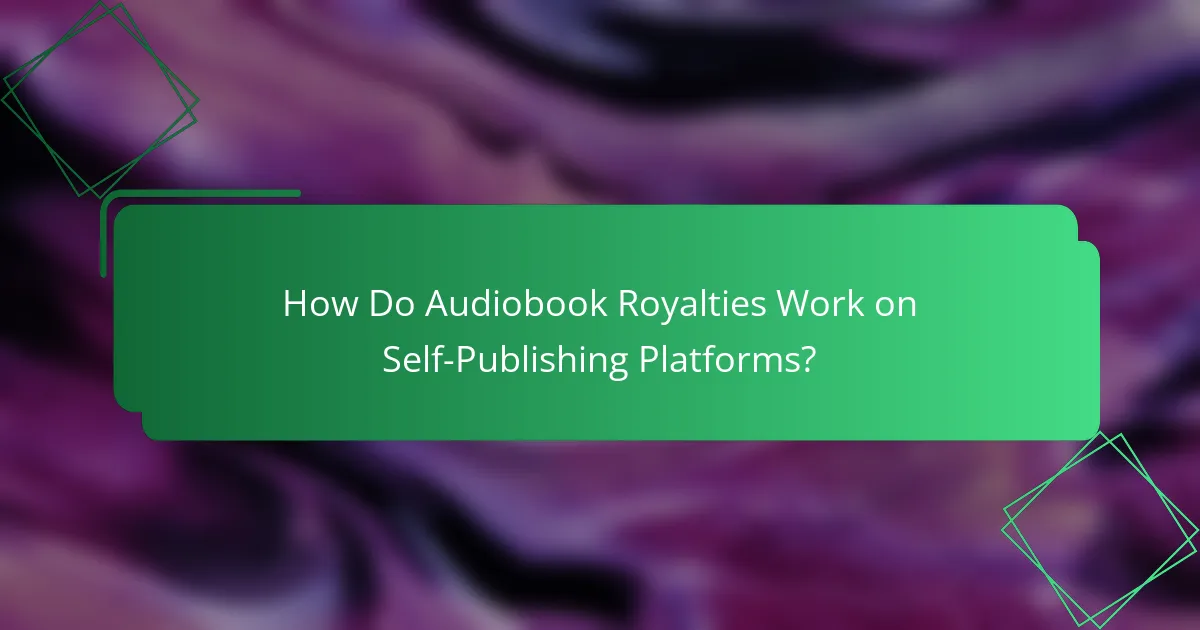
How Do Audiobook Royalties Work on Self-Publishing Platforms?
Audiobook royalties on self-publishing platforms typically involve authors earning a percentage of sales revenue from their audiobooks. The exact percentage can vary based on the platform and the type of distribution agreement chosen by the author.
Royalty Structures
Royalty structures can differ significantly among self-publishing platforms. For example, platforms like Audible often offer authors around 25% of the sales price for exclusive distribution, while non-exclusive deals may yield lower percentages, such as 20%. Understanding these structures helps authors choose the best option for their financial goals.
Some platforms may also offer tiered royalty rates based on sales volume, incentivizing authors to promote their audiobooks more actively. It’s crucial to read the fine print to grasp how royalties accumulate and are calculated.
Payment Frequency
Payment frequency for audiobook royalties varies by platform, with many offering monthly or quarterly payments. For instance, Audible typically pays royalties monthly, but authors may need to wait a few months after their audiobook’s release to receive their first payment due to processing times.
Authors should also consider the minimum payout thresholds, which can affect when they receive their earnings. Some platforms require a minimum balance before issuing payments, so it’s wise to keep track of sales and royalties regularly.
Exclusive vs. Non-Exclusive Deals
Choosing between exclusive and non-exclusive deals is a critical decision for authors. Exclusive agreements, often with platforms like Audible, generally offer higher royalty rates but limit distribution to that platform. This can maximize earnings if the platform has a large audience.
On the other hand, non-exclusive deals allow authors to distribute their audiobooks across multiple platforms, potentially reaching a broader audience. However, the trade-off is usually lower royalty rates. Authors should evaluate their marketing strategies and audience reach when making this choice.
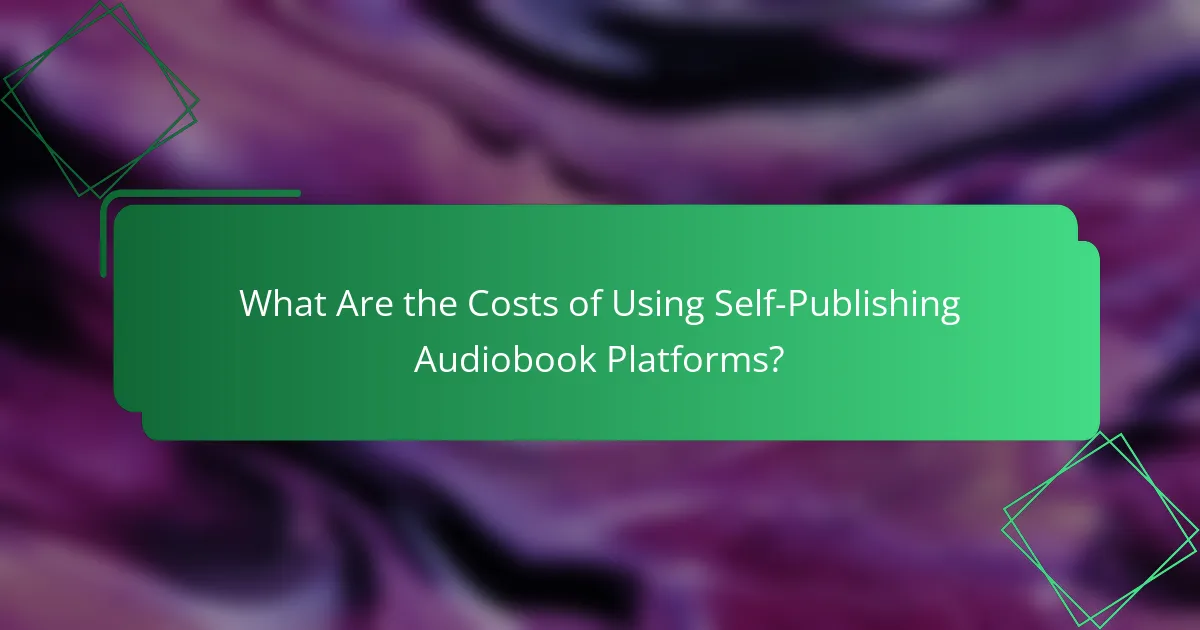
What Are the Costs of Using Self-Publishing Audiobook Platforms?
The costs of using self-publishing audiobook platforms can vary widely based on several factors, including upfront fees, ongoing charges, and production expenses. Understanding these costs is crucial for authors to budget effectively and maximize their profits.
Upfront Costs
Upfront costs typically include fees for setting up your audiobook on the platform. Many platforms, like Audible and Findaway Voices, may charge a one-time fee or a percentage of your royalties. Expect these fees to range from zero to a few hundred dollars, depending on the services provided.
Some platforms may also require you to purchase a professional narration service, which can significantly increase initial expenses. If you choose to narrate the audiobook yourself, this cost can be minimized, but you will need to invest in quality recording equipment.
Ongoing Fees
Ongoing fees can include monthly subscription costs or commission percentages taken from your sales. For example, platforms like ACX typically take a percentage of your royalties, which can be around 25% to 40% depending on your distribution choices.
Additionally, some platforms may charge for promotional tools or services that can help increase your audiobook’s visibility. Be sure to factor these potential costs into your overall budget to avoid surprises later.
Production Costs
Production costs encompass expenses related to recording, editing, and mastering your audiobook. Hiring a professional narrator can cost anywhere from a few hundred to several thousand dollars, depending on their experience and the length of your audiobook.
In-house production can save money, but it requires a significant time investment and expertise in audio editing. If you opt for DIY production, consider using affordable software and online resources to help you achieve a professional sound.
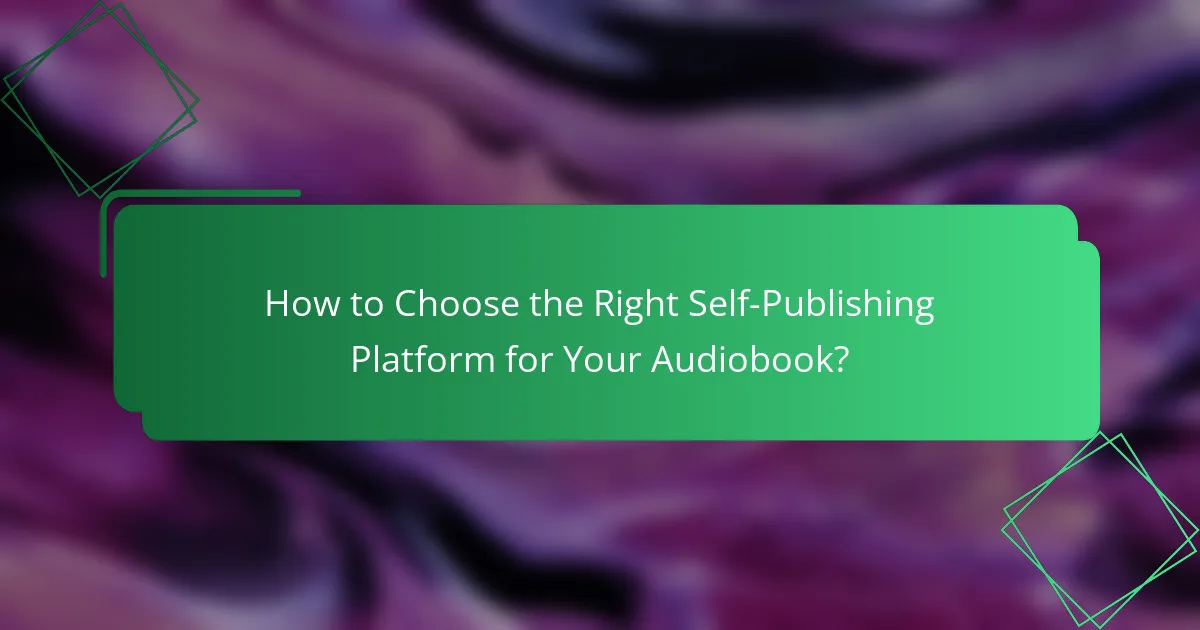
How to Choose the Right Self-Publishing Platform for Your Audiobook?
Choosing the right self-publishing platform for your audiobook involves assessing your specific needs and understanding the features each platform offers. Consider factors such as distribution reach, royalty rates, and ease of use to find the best fit for your project.
Assess Your Goals
Start by defining what you want to achieve with your audiobook. Are you looking for maximum exposure, or are you more focused on higher royalty rates? Knowing your goals will help narrow down your options.
For example, if your primary aim is to reach a wide audience, platforms like Audible or Google Play may be ideal due to their extensive user bases. Conversely, if you prioritize keeping a larger share of your earnings, consider platforms that offer higher royalty percentages, such as Findaway Voices.
Evaluate Platform Features
Different self-publishing platforms come with varying features that can significantly impact your audiobook’s success. Look for options that provide robust distribution channels, marketing tools, and user-friendly interfaces.
Key features to consider include the ability to distribute to multiple retailers, access to analytics for tracking sales, and support for promotional campaigns. Some platforms may also offer additional services like audiobook production assistance or cover design, which can be beneficial if you are new to publishing.
Lastly, review the pricing structure and any hidden fees associated with each platform. Understanding the costs involved will help you make an informed decision that aligns with your budget and goals.
